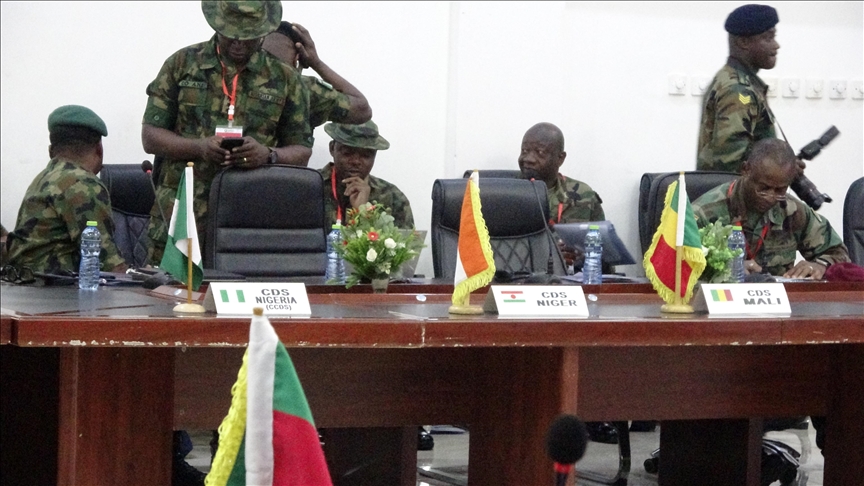EXPLAINER - Why are Mali, Burkina Faso, and Niger quitting West Africa's regional bloc?
ECOWAS is unlikely to let its 3 military-run suspended members 'go without negotiating,' after they announced plans to leave the bloc, says political scholar Edwin Yingi
 Chiefs of staff of the Economic Community of West African States (ECOWAS) attend the meeting to find a solution to the governance crisis in Niger, in Accra, Ghana on August 17, 2023.
Chiefs of staff of the Economic Community of West African States (ECOWAS) attend the meeting to find a solution to the governance crisis in Niger, in Accra, Ghana on August 17, 2023.
- ECOWAS is unlikely to let its 3 military-run suspended members 'go without negotiating,' after they announced plans to leave the bloc, says political scholar Edwin Yingi
- Their withdrawal will present a number of challenges to the bloc, the region, and themselves, both economically and security-wise, experts warn
- ECOWAS has said it received no direct formal communication from Mali, Burkina Faso, or Niger on their intention to withdraw
JOHANNESBURG
Military juntas from three West African nations recently announced plans to withdraw from the Economic Community of West African States (ECOWAS) beset by months of tension.
In a joint statement on Sunday, the leaders of Niger, Mali, and Burkina Faso declared that they had made the "sovereign decision" to quit the influential regional bloc of 15 member countries.
For months now, tensions have been running high between these three countries and ECOWAS, which imposed sanctions on them after coups that took place in Mali in 2020, Burkina Faso in 2022, and Niger in July 2023.
After the most recent putsch in Niamey, ECOWAS even threatened to use force and re-instate the deposed President Mohamed Bazoum, ousted on July 26 and detained by members of his guard detail.
But the military juntas in neighboring Mali and Burkina Faso threatened to intervene should ECOWAS invade Niger.
According to Buchanan Ismael, a political scientist at the University of Rwanda, ties between ECOWAS and the three military-run countries have been on the decline for a long time.
This was due to "the bloc's choice of sanctions as a key tool in trying to reverse the coups in those three countries," Ismael told Anadolu.
The three military regimes said in a statement that instead of ECOWAS helping their countries fight terrorism and other security threats, they took action to impose sanctions.
They also accuse the bloc of allegedly being under the influence of foreign powers.
But ECOWAS says it is opposed to frequent coups in the region that undermine democracy and derail economic and regional integration, as meaningful economic activities cannot be conducted in non-peaceful environments.
Challenges of withdrawal
Edwin Yingi, a South Africa-based political scholar, told Anadolu that the exit of the three nations will present a number of challenges for both ECOWAS and the region, as it undermines some of the bloc's founding principles.
"If their mission to pull out from ECOWAS becomes successful, then we are going to see the hindrance of free movement of people in the region, which will affect trade, foreign direct investment, and economic cooperation," said Yingi, a postdoctoral fellow at the department of political sciences at the University of South Africa.
According to him, their exit could help set the scene for foreign intervention in the region, as they have already cut ties with France and other European countries offering them support in the fight against terrorism.
The departure of France and other Western countries has now created a vacuum being filled by Russia, with others also likely to come in, Yingi explained.
Last year, Burkina Faso's military leaders ordered France to withdraw hundreds of its troops from the West African country months after Mali had done the same.
In August 2023, Niger also announced it was overturning several military cooperation agreements with France and other Western nations.
In a statement this month, France announced the closure of its embassy in Niger, citing obstacles in its operations.
Ismael believes that the withdrawal of Mali, Burkina Faso, and Niger will create challenges for them in their fight with terrorism and stoke insecurity in the countries faced with insurgency.
Yingi, meanwhile, believes the trio's aim might be to coerce other ECOWAS members to lift their suspension from the bloc.
"I don't see ECOWAS letting them go without negotiating. It is, however, too early to tell what's their intention."
He added that if the three landlocked countries do actually withdraw, they will face major economic obstacles as they will need to access the sea through other ECOWAS members.
No official communication
In a statement, ECOWAS said it had yet to receive any direct formal communication from Mali, Burkina Faso, or Niger about their stated intention to withdraw.
"The ECOWAS commission as directed by the Authority of Heads of State and Government have been working assiduously with these countries for the restoration of constitutional order," it said.
Underlining the importance of the three nations as members of the community, it said the bloc is committed to finding a negotiated solution to the current political impasse.
Anadolu Agency website contains only a portion of the news stories offered to subscribers in the AA News Broadcasting System (HAS), and in summarized form. Please contact us for subscription options.

